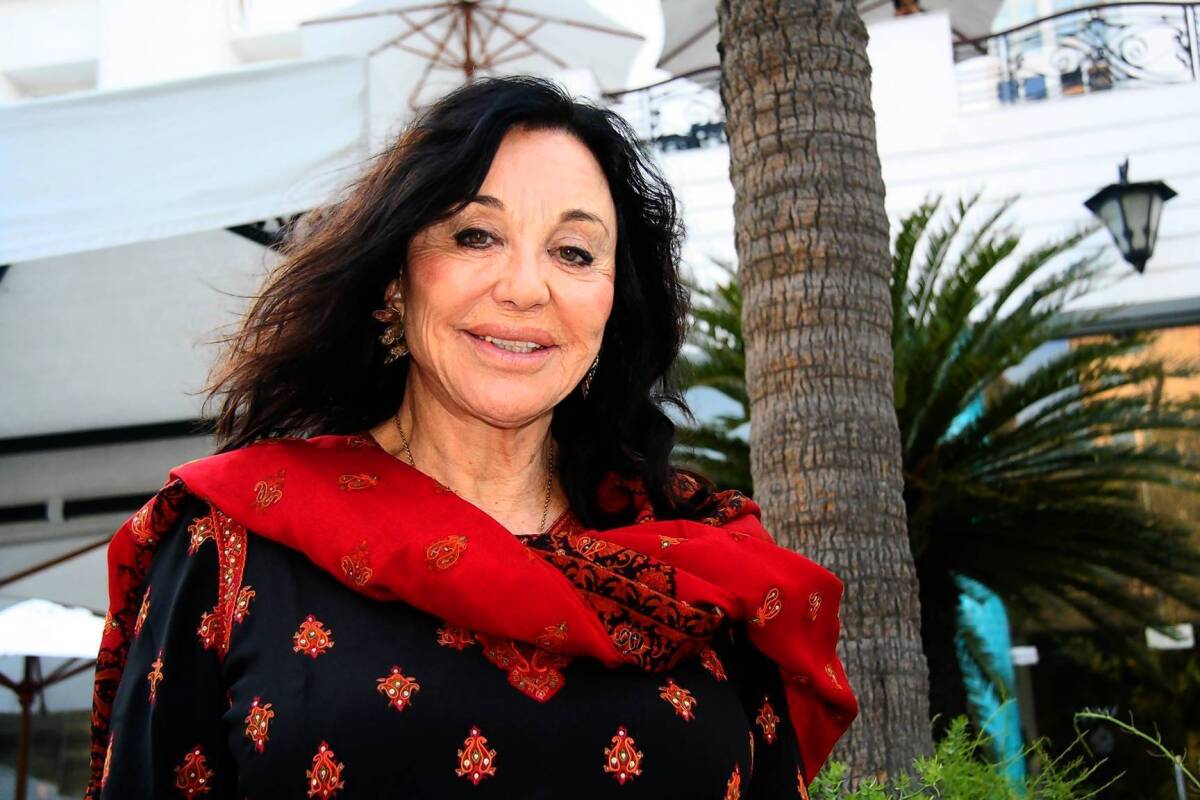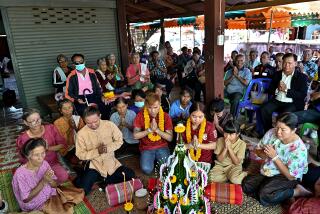French countess is key advocate for AIDS patients in Myanmar

- Share via
SHWEPYITHA, Myanmar — After her heroin-addict husband died five years ago, Ei Ei Phyu discovered she was HIV-positive. She thought her life was over until friends directed her to the open-air clinic here where she receives antiretroviral medicine.
“This place has been a blessing,” she said.
Phyu and thousands of other patients in Myanmar and beyond owe their health to a French countess, Albina du Boisrouvray, 70. Inspired by the memory of her late son and her inherited fortune, she created the charity Assn. Francois-Xavier Bagnoud, or FXB, and for two decades has been battling government restrictions, inefficiency and medical stigmas in 15 Asian, African and Latin American nations.
Among her more challenging venues has been long-isolated Myanmar, also known as Burma, where she has used connections, pressure and perseverance to chip away at barriers.
“I imagine they felt it was an honor to have a European countess come to Myanmar,” said Dr. Aye Aye Thein, project coordinator at the FXB clinic in Shwepyitha, outside Yangon. “She’s very attractive, has a way of getting around problems. It’s hard to say ‘no.’”
Du Boisrouvray, whose father hailed from French aristocracy and whose maternal grandfather was known as the Bolivian “Tin King,” isn’t keen to discuss titles, wealth and chateaux.
But she is quite happy to discuss brothels in Thailand, which led her to Myanmar in the early 1990s. A raid in Ranong province that she’d pressured Thai police into conducting — one of several FXB initiatives worldwide since 1990 aimed at tackling AIDS, education and child exploitation — freed several dozen underage sex workers, including eight HIV-positive Burmese girls. Told they’d been repatriated, she later learned that they’d been killed, their bodies dumped in the Moei River dividing Thailand and Myanmar. She accused Myanmar’s generals at an international conference of complicity in the girls’ slaying.
When a second Thai raid freed 95 more Burmese sex workers, half of them HIV-positive, she decided to visit Myanmar to ensure the young women’s safety. The military government was furious about the public slight, however, and turned down her visa request.
For a year she fought back, eventually pulling French diplomatic strings to help secure a visa.
“I can be pushy,” Du Boisrouvray said, dressed in a sari at a luxury hotel in New Delhi, where she was inspecting a project involving homeless children in railway stations. “If you put me out the door, I’d come through the window.”
Rather surprisingly, Myanmar finally welcomed her. She later concluded that Thai police probably killed the women and the Burmese wanted to prove their innocence.
She decided to establish an FXB presence in the politically isolated country, following on earlier FXB clinics and village projects in Thailand, Uganda, Burundi and Bolivia, among others. But the path was often rocky.
Du Boisrouvray contacted Nobel laureate Aung San Suu Kyi’s English husband, and got word back that the then-detained human rights champion sanctioned her contacts with the ruling generals, given the upside for the Burmese people.
Each time she worked with the government, Du Boisrouvray sought to reach out to pro-democracy activists. She named Suu Kyi to the board of a Harvard University health and human rights center she established, asking the government for permission to visit Suu Kyi and tell her about the selection.
The health minister excoriated her in Burmese. “You give me headaches,” he concluded.
She locked horns with the government again when James Leander Nichols, the Scandinavia consul, a friend and British passport holder, died in prison in 1996, jailed for having two fax machines and assisting Suu Kyi. Outraged, Du Boisrouvray wrote a New York Times column urging tourists to shun Burma. She didn’t get another visa for six years.
In 2003, Myanmar relented. She soon met with then-Prime Minister Khin Nyunt, who realized that soldiers and ruling families also could be infected with HIV, Du Boisrouvray said. “They were sizing me up, decided they might as well get some of the money inside,” she said.
The prime minister was soon pushed aside in a power struggle, however, and things again became difficult.
In recent years, as Myanmar has opened its doors to the world , FXB’s aims have increasingly dovetailed with those of a government struggling to reform healthcare after decades of neglect.
The program includes medical treatment, women’s support groups, job training, support for 48 HIV-positive orphans as well as administration of an AIDS education theater group and sale of crafts made by patients. In referring patients to state hospitals, FXB found that many Myanmar doctors knew little about HIV/AIDS, so it has helped to educate them.
In official meetings, she has praised government reform moves, she said, but has urged Myanmar planners to avoid what she sees as the West’s mistakes, including environmental degradation and rampant consumerism.
Du Boisrouvray’s decision to set up FXB followed a somewhat tortuous path. Born in Nazi-occupied France during World War II, she was smuggled out — her father was part of the Free French movement — as an infant. She and her mother moved to New York and lived at the Plaza Hotel, she said.
Her father later moved them to Argentina, Switzerland, Morocco, England and France.
“They treated me like a parcel,” said Du Boisrouvray, who lives in Paris and Geneva. “I don’t feel French. I feel Gypsy.”
She developed an independent, anti-authoritarian streak and searched for meaning, embracing Marxism, feminism, militant ecology, film production and politics.
A marriage to a pilot when she was 20 produced a son, Francois. The marriage lasted four years, and she vowed to give her son the stability she’d never had. Francois loved flying, obtaining his pilot’s license at 11, she said. The same year, he retrieved his first corpse on an alpine rescue mission.
On the death of her father in 1980, Du Boisrouvray inherited his fortune and planned to divide it with her son. But in 1986, at age 24, he was killed piloting a rescue helicopter during a desert road race in Mali. His death shattered her, but it was a catalyst.
In 1989, she sold her film production company, jewelry, art, houses and real estate business, funneling $100 million into FXB, named after her son.
FXB, which has 450 employees and 100 programs worldwide, focuses on AIDS orphans, human rights, education, nutrition, health and children’s rights.
“It can seem disorganized, but it all has to do with Francois,” she said of FXB, which promotes self-sufficiency over handouts. “Charity’s a Band-Aid.”
Although few doubt her commitment, some question her administrative skills.
“Poor management for many years has left organizational capacity weak,” an unnamed employee wrote on the website glassdoor.com.
FXB’s active approach has helped pull families out of poverty, Du Boisrouvray countered, even as it focuses more on local decision-making.
Although it’s become easier to operate in Myanmar, huge challenges remain. The United Nations estimates that only a third of about 120,000 HIV-positive Burmese receive antiretroviral drugs.
“People are poor and education is low, so you have to give instructions repeatedly,” said Saw Lin Hutt, a community educator and counselor at FXB’s Shwepyitha clinic. “They don’t take their drugs. They don’t come for follow-ups.
“But it’s gradually getting better.”
Magnier was recently on assignment in Myanmar.
More to Read
Sign up for Essential California
The most important California stories and recommendations in your inbox every morning.
You may occasionally receive promotional content from the Los Angeles Times.













